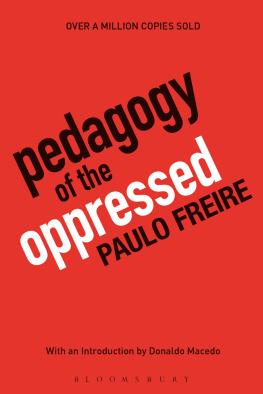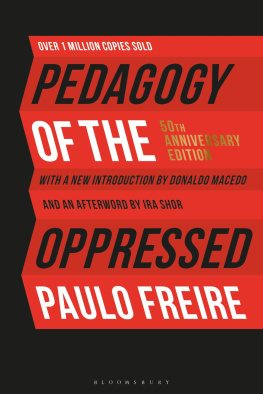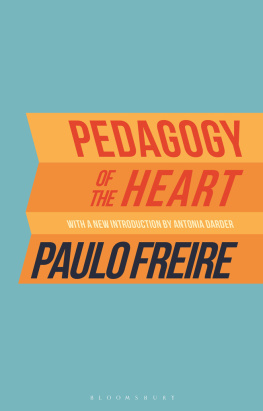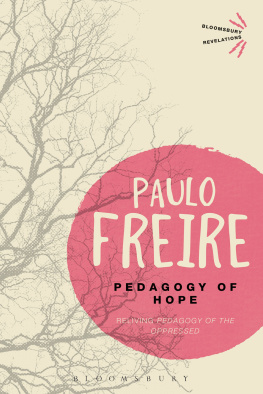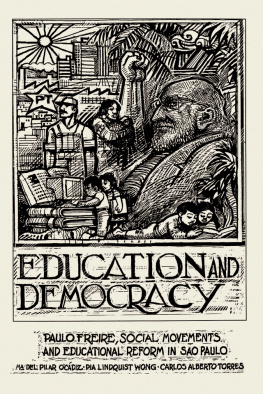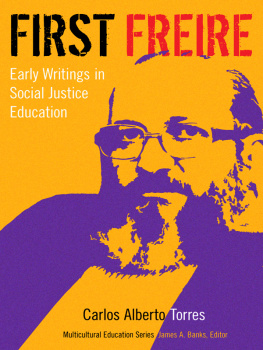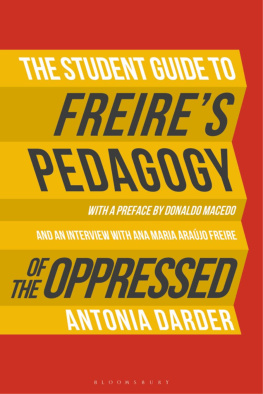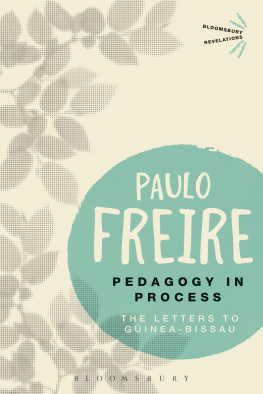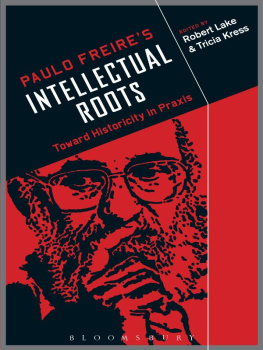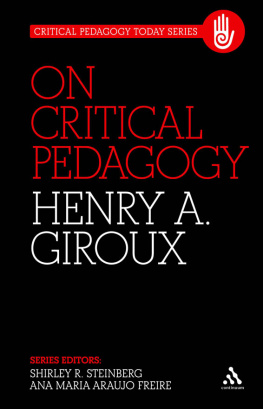Paulo Freire - Pedagogy of the Oppressed
Here you can read online Paulo Freire - Pedagogy of the Oppressed full text of the book (entire story) in english for free. Download pdf and epub, get meaning, cover and reviews about this ebook. year: 2014, publisher: Bloomsbury Academic, genre: Politics. Description of the work, (preface) as well as reviews are available. Best literature library LitArk.com created for fans of good reading and offers a wide selection of genres:
Romance novel
Science fiction
Adventure
Detective
Science
History
Home and family
Prose
Art
Politics
Computer
Non-fiction
Religion
Business
Children
Humor
Choose a favorite category and find really read worthwhile books. Enjoy immersion in the world of imagination, feel the emotions of the characters or learn something new for yourself, make an fascinating discovery.
- Book:Pedagogy of the Oppressed
- Author:
- Publisher:Bloomsbury Academic
- Genre:
- Year:2014
- Rating:3 / 5
- Favourites:Add to favourites
- Your mark:
- 60
- 1
- 2
- 3
- 4
- 5
Pedagogy of the Oppressed: summary, description and annotation
We offer to read an annotation, description, summary or preface (depends on what the author of the book "Pedagogy of the Oppressed" wrote himself). If you haven't found the necessary information about the book — write in the comments, we will try to find it.
Pedagogy of the Oppressed — read online for free the complete book (whole text) full work
Below is the text of the book, divided by pages. System saving the place of the last page read, allows you to conveniently read the book "Pedagogy of the Oppressed" online for free, without having to search again every time where you left off. Put a bookmark, and you can go to the page where you finished reading at any time.
Font size:
Interval:
Bookmark:
OTHER BOOKS BY PAULO FREIRE FROM BLOOMSBURY ACADEMIC
Education for Critical Consciousness
Pedagogy of the City
Pedagogy of Hope:
Reliving Pedagogy of the Oppressed
Pedagogy of the Heart

Bloo msbury Academic
An imprint of Bloomsbury Publishing Inc
1385 Broadway | 50 Bedford Square |
New York | London |
NY 10018 | WC1B 3DP |
USA | UK |
www.bloomsbury.com
Bloomsbury is a registered trade mark of Bloomsbury Publishing Plc
First published in 2000 by the Continuum International Publishing Group Inc
Reprinted 2011, 2012
Reprinted by Bloomsbury Academic 2012, 2013, 2014
Paulo Freire 1970, 1993
Introduction Donaldo Macedo 2000
All rights reserved You may not copy, distribute, transmit, reproduce or otherwise make available this publication (or any part of it) in any form, or by any means (including without limitation electronic, digital, optical, mechanical, photocopying, printing, recording or otherwise), without the prior written permission of the publisher. Any person who does any unauthorised act in relation to this publication may be liable to criminal prosecution and civil claims for damages.
No responsibility for loss caused to any individual or organization acting on or refraining from action as a result of the material in this publication can be accepted by Bloomsbury or the author.
To find out more about our authors and their books please visit www.bloomsbury.com where you will find extracts, author interviews and details of forthcoming events, and to be the first to hear about latest releases and special offers, sign up for our newsletters here.
Library of Congress Cataloging-in-Publication Data
A catalog record for this book is available from the Library of Congress.
ISBN: PB: 978-0-8264-1276-8
e-PDF: 978-1-5013-0531-3
e-PUB: 978-1-5013-0532-0
To the oppressed, and to those who suffer with them and fight at their side
Contents
The justification for a pedagogy of the oppressed; the contradiction between the oppressors and the oppressed, and how it is overcome; oppression and the oppressors; oppression and the oppressed; liberation: not a gift, not a self-achievement, but a mutual process.
The banking concept of education as an instrument of oppressionits presuppositionsa critique; the problem-posing concept of education as an instrument for liberationits presuppositions; the banking concept and the teacher-student contradiction; the problem-posing concept and the supersedence of the teacher-student contradiction; education: a mutual process, world-mediated; people as uncompleted beings, conscious of their incompletion, and their attempt to be more fully human.
Dialogicsthe essence of education as the practice of freedom; dialogics and dialogue; dialogue and the search for program content; the human-world relationship, generative themes, and the program content of education as the practice of freedom; the investigation of generative themes and its methodology; the awakening of critical consciousness through the investigation of generative themes; the various stages of the investigation.
Antidialogics and dialogics as matrices of opposing theories of cultural action: the former as an instrument of oppression and the latter as an instrument of liberation; the theory of antidialogical action and its characteristics: conquest, divide and rule, manipulation, and cultural invasion; the theory of dialogical action and its characteristics: cooperation, unity, organization, and cultural synthesis.
This is the thirtieth anniversary of the publication in the United States of Pedagogy of the Oppressed. Since the original publication, this revolutionary work has gone into more than a score of printings and sold over 750,000 copies worldwide.
In his foreword to the first edition, which is included in this one, Richard Shaull wrote:
In this country, we are gradually becoming aware of the work of Paulo Freire, but thus far we have thought of it primarily in terms of its contribution to the education of illiterate adults in the Third World. If, however, we take a close look, we may discover that his methodology as well as his educational philosophy are as important for us as for the dispossessed in Latin America.... For this reason, I consider the publication of Pedagogy of the Oppressed in an English edition to be something of an event.
These words have proved prophetic. Freires books have since taken on a considerable relevance for educators in our own technologically advanced society, which to our detriment acts to program the individualespecially the disadvantagedto a rigid conformity. A new underclass has been created, and it is everyones responsibility to react thoughtfully and positively to the situation. This is the underlying message of Pedagogy of the Oppressed.
As times change so do attitudes and beliefs. The translation has been modifiedand the volume has been newly typesetto reflect the connection between liberation and inclusive language. An important introduction by Donaldo Macedo has been added.
This revised thirtieth-anniversary edition of Pedagogy of the Oppressed thus represents a fresh expression of a work that will continue to stimulate and shape the thought of educators and citizens everywhere.
Never in my wildest dreams would I have imagined when I first read Pedagogy of the Oppressed in 1971 that, a decade later, I would be engaged in a very close collaboration with its author, Paulo Freirea collaboration that lasted sixteen years until his untimely death on May 2, 1997. Never in my wildest dreams would I have thought that, today, I would have the honor to write an introduction to commemorate the thirtieth anniversary of the publication of Pedagogy of the Oppressed, a book that according to Stanley Aronowitz, meets the single criterion of a classic in that it has outlived its own time and its authors.
I remember vividly my first encounter with Pedagogy of the Oppressed, as a colonized young man from Cape Verde who had been struggling with significant questions of cultural identity, yearning to break away from the yoke of Portuguese colonialism. Reading Pedagogy of the Oppressed gave me a language to critically understand the tensions, contradictions, fears, doubts, hopes, and deferred dreams that are part and parcel of living a borrowed and colonized cultural existence. Reading Pedagogy of the Oppressed also gave me the inner strength to begin the arduous process of transcending a colonial existence that is almost culturally schizophrenic: being present and yet not visible, being visible and yet not present. It is a condition that I painfully experienced in the United States, constantly juggling the power asymmetry of the two worlds, two cultures, and two languages. Reading Pedagogy of the Oppressed gave me the critical tools to reflect on, and understand, the process through which we come to know what it means to be at the periphery of the intimate yet fragile relationship between the colonizer and the colonized.
Paulo Freires invigorating critique of the dominant banking model of education leads to his democratic proposals of problem-posing education where men and women develop their power to perceive critically the way they exist in the world with which and in which they find themselves; they come to see the world not as a static reality but as a reality in the process of transformation. This offered to meand all of those who experience subordination through an imposed assimilation policya path through which we come to understand what it means to come to cultural voice. It is a process that always involves pain and hope; a process through which, as forced cultural jugglers, we can come to subjectivity, transcending our object position in a society that hosts us yet is alien.
Next pageFont size:
Interval:
Bookmark:
Similar books «Pedagogy of the Oppressed»
Look at similar books to Pedagogy of the Oppressed. We have selected literature similar in name and meaning in the hope of providing readers with more options to find new, interesting, not yet read works.
Discussion, reviews of the book Pedagogy of the Oppressed and just readers' own opinions. Leave your comments, write what you think about the work, its meaning or the main characters. Specify what exactly you liked and what you didn't like, and why you think so.

